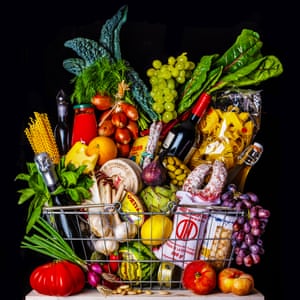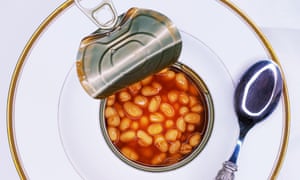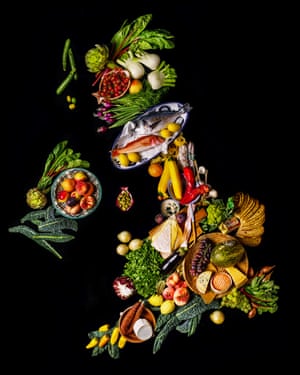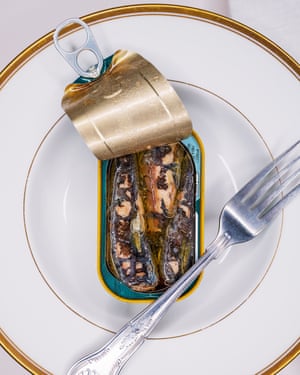Futures Forum: Brexit: and food self-sufficiency
Especially when it comes to fruit and veg:
Futures Forum: Brexit: and free trade in lettuce
Futures Forum: Brexit: and our dependence on foreign goods and labour
The Observer looked at what this would mean post-Brexit:
Food and Brexit: will our cupboards be bare?
From farmers and poultry producers to professors of food policy, those on the frontline have been sounding the alarm. So how will the UK cope after 29 March 2019?
It is a warm day and the European Commission building, on leafy Smith Square a few streets away from the Houses of Parliament, has laid on a buffet. There will be sandwiches. There will be roasted chicken legs. Whether anybody will have an appetite for it after the event it is to follow is another matter entirely; perhaps they’ll decide to fill their pockets in an attempt to stock up for possible shortages to come. A panel of the learned, the well-read and the frankly terrified has gathered here to discuss the likely impact of Brexit on Britain’s food sector, and it is not a jolly event.
Julie Girling, Conservative MEP for south-west England and Gibraltar and a specialist in European food systems, tells us she is normally a sunny, optimistic soul. Not today. “There is very little good news coming out of Brexit,” she says, bleakly. “It’s a tragedy that we have no certainty.” Nick von Westenholz from the National Farmers Union (NFU), many of whose members voted out, takes us through various trading scenarios – customs tariffs going up, down or disappearing altogether – all of which impact the farming sector’s finances in complex ways and therefore its ability to produce more, which we may well need to do post-Brexit to keep ourselves fed.
Sue Davies from Which?, the Consumers’ Association, agonises over what a deal with the United States would mean. They have studied public opinion. “Eighty per cent of people are uncomfortable with beef raised with growth hormones; 73% don’t want chlorinated chicken.” And yet, increasingly, that’s what is on the agenda, along with the possibility of meat imports from Australia currently banned by the EU, also because of their use of growth hormones. Girling sums up: “It’s time the food industry stood up and said Brexit is a disaster.”
At the end of September, it will be six months until we officially leave the European Union. Those who support Brexit obviously see it as the start of a bright new tomorrow for Britain. The dire predictions at that seminar would quickly be dismissed as alarmism. After all, it was held in the London headquarters of the European Commission. It was hardly likely to be a cheerleading session. As with many of the keen Brexiteers’ positions, it may be short on facts, but it is certainly an opposing view.
Nevertheless, for many experts in the British food industry, among them the farmers, producers and retailers upon whom we depend, Brexit is increasingly seen as a potential calamity with which the British government has failed to engage. It is one which brings with it the likelihood of disruption to our food supply, including unharvested produce and empty supermarket shelves; it is the symptom of Brexit which is likely to have the quickest and most direct impact on the British populace.
On 10 July, the Sun reported that ministers were drawing up secret plans to stockpile processed foods, in case the talks collapsed. When challenged on the story a few days later, the new Brexit secretary Dominic Raab described it as a “selective snippet” but refused to deny it. (CRU, a firm offering analysis of the global metals business, announced it was a huge opportunity for the tinplate market because of the interest in canned foods that would follow.) The stockpiling story was quickly followed by a news report that the army was on standby to get vital supplies to the right places, and an announcement by the NFU that in the event of a no-deal Brexit stopping imports, Britain would run out of food in August 2019.
Of course, none of it has happened yet. As the long hot summer of 2018 rolled on, with ministerial resignations, accusations on all sides of unhelpful hyperbole about “cliff edge” and “no-deal Brexits”, the situation has been as clear as the proverbial mud. At the time of writing we genuinely do not know what is going to happen on 29 March 2019. For a journalist with a long deadline trying to assess the situation, it’s like plaiting sand.
But that’s only if you view Brexit as a single event which is going to happen on a Friday, six months hence. In terms of Britain’s food-supply chain, it isn’t. Brexit’s impact is already being felt. Food producers are large-scale businesses that have to make investment decisions years ahead. And faced by the uncertainty of Brexit that’s exactly what they’re doing.
PD Hook in Oxfordshire is one of Britain’s largest poultry producers, bringing 900,000 chickens to market a week, for everything from budget ranges to premium brands. “We’ve been expanding by 3-5% every year for the past 30 years,” managing director James Hook tells me. “Because of Brexit we’re holding our volume as it is for this year and next year. Basically, we’ve reduced our capital expenditure by half until we know what’s happening.” In real terms, he says, this means the company is “going backwards”. But he sees it as the smart decision.
“If we have a hard, cliff-edge Brexit, then we might have to make trade deals that result in cheap chicken coming in from the US. We might have cheaper product coming from Thailand and Brazil, and that would mean a price drop across the market.” He has other pressing concerns, especially around workforce. Although we have had a commitment from the British government that EU nationals already working here can stay, there has not yet been clarity on a registration system. Hook’s business is dependent on eastern European labour and right now, he says, he has double the number of vacancies he is used to.
Ali Capper who runs Stocks Farm, a producer of fruit and hops in Worcestershire, tells a similar story. “When you’re running a business like ours you’re making investment decision five or 10 years ahead.” They had been thinking about replenishing their orchards with new saplings. “These trees come from Belgium and Holland, but we don’t know whether they would come to us with tariffs or not,” Capper says. “And whether they’d be delayed at the border.” So, for now, they’ve halted investment.
“But the biggest crisis is where the people are going to come from to grow, pick and pack,” Capper continues. The issue is not entirely caused by Brexit. Expansion of many eastern European economies means people in, say, Poland are now staying home and finding jobs there. However, many food producers report people from other countries being put off the UK by a fall in the pound due to the Brexit vote, and uncertainty over their status. As one person put it to me, “They have doubts as to whether they are even welcome here post the vote.” Forty per cent of migrant labour from the EU into Britain is involved in food manufacture. (Nine days ago, environment secretary Michael Gove announced an agricultural-worker visa pilot scheme, to commence in spring 2019. While the idea was welcomed by the industry, the number of visas – just 2,500, or 4% of the work force – was dismissed as feeble.)
Companies such as Tilda are simply moving production. Thirty per cent of the rice it processes at its UK sites is bound for other countries in the EU. “We know what leaving the customs union will look like,” says Jon Calland, head of external affairs for Tilda. “It means the UK will get third-country status.” That could bring with it large tariffs. Products like rice, which are only processed in the UK rather than grown here, will fall foul of exceptionally complex “rules of origin”. These govern the degree to which a foodstuff can have an input from outside the EU before it incurs a higher cost.
“You talk to the UK government about rules of origin and they simply haven’t got a clue,” says Calland. The consumer doesn’t need to understand them either, he says; all we need to know is that Tilda has decided to move a third of the business – a third of the turnover, a third of the jobs – out of the UK and into another EU country. “And with it will go the tax we could be paying to the UK exchequer.”
It is a story which, anecdotally, appears to be repeated across the food sector: halted investment, shifted production, uncertainty. It indicates a shrinking of the food economy is under way. It also means Britain’s food production is going to stall and even go into reverse at the exact moment it needs to go up. Only 49% of the food we consume in this country is now produced here. Another 30% comes directly from the EU. That’s 10,000 shipping containers a day. Another 11% of the food we consume arrives under EU deals with third countries outside the EU; 70% of the cropland required to grow our food is located abroad.
People with knowledge of discussions within government told me about leading figures in the food industry going to see Theresa May to plead their case. “She just stonewalled them,” one told me. Angus Davison of fruit company Haygrove summed up the views of many people across the food industry when he said of the prime minister, “She’s not interested in us and not listening to us. She’s an intelligent person, so I presume she doesn’t care and is prepared to sacrifice the industry.”
Then, on 6 July, came a chink of light: the Chequers agreement and the white paper that followed six days later. It included a reference to the desire for the continued free flow of food and agricultural goods between Britain and the EU, on the same terms as now. Perhaps May had been listening after all. If so, it made little difference. First David Davis resigned as Brexit secretary, announcing this was a deal he couldn’t sell. He was followed by Boris Johnson’s resignation as foreign secretary.
Sources within the EU indicated that the white paper was an attempt to cherry-pick the best of EU membership without the rest of the contract, including free movement of labour, and therefore wouldn’t be acceptable. A no-deal Brexit came back on to the agenda. Stories filled the press about likely shortages of quality cheeses and dairy in general, accompanied by massive price rises, because the UK does not produce enough milk for its needs.
On 23 July, the Centre for Food Policy, based at City, University of London, published a briefing paper authored by leading academics including Tim Lang, professor of food policy. It was called “Feeding Britain: Food Security after Brexit”. It made for sobering reading. We no longer had food reserves, it said, and were dependent on technology and frictionless trade for our full supermarket shelves. “A food system engineered on a three-to-five-day ‘just in time’ logistics and delivery system has the potential to break down in less than a week,” it said.
It’s a theme echoed by Richard Burnett of the Road Haulage Association. “It’s a really serious situation and it feels like it’s getting worse. If we end up with no deal, what does that mean for the supply chain?” Various logistics experts have pointed out that an extra two minutes of checks per truck would result in a 17-mile tailback within a day, for both importers and exporters on both sides of the channel. “The thing is, checks on non-EU trucks don’t take a couple of minutes,” Burnett told me. “They can take two or three hours.” Post-Brexit, British trucks would be non-EU. A team from London’s Imperial College subsequently estimated those queues could be 29 miles long at peak times on the British side, and there’s no reason to suppose it wouldn’t be the same on the French. And time that food spends at the docks is time off its shelf-life, and an increase in cost.
What’s more, Britain is in no state to fill the hunger gap if there are delays to getting food in. “To alter this could take years, possibly decades,” the Centre for Food Policy report says. In August, the University of Hertfordshire announced it had received a £400,000 research grant to investigate maximising quality food production post-Brexit, but it would indeed take years for this relatively small research project to have an impact on our food supply. This has been portrayed by Brexiteers as a massive opportunity for British farming. There would be huge demand. But as von Westenholz of the NFU explained to me, entirely British farming is not as common as many assume: “Many forms of farming depend on inputs from abroad, like animal feed or saplings.” Farming is a complex international web.
Elsewhere in the report, they examine the keen Brexiteer’s notion that the way forward would be a big deal with the US. Wilbur Ross, the US commerce secretary, has already made it clear that such a deal would only happen if the UK removed the objections to the use of growth hormones in the raising of beef and the chlorine washing of chicken. Both of these are prohibited under EU food law. As the EU withdrawal bill simply writes EU law over into UK law, they will be illegal here too after Brexit unless we later decide otherwise. But the key issue, according to the report, is scale. The US is currently only the 10th largest exporter of food to the UK. “For the USA to replace the combined food imports from the other nine in the top 10 would require a vast food flotilla and logistics operation exceeding that of the 1940-45 Atlantic convoys.”
That said, the language of the report is practically staid compared to that used by Lang when we talk shortly after its publication. “This is the biggest challenge Britain has faced since the early 1940s,” he says. “A hard Brexit would be an unprecedented event in modern food history.” He describes a face-to-face meeting with Gove. “I told him he was driving the country into a food security crisis. He looked incredulous.”
But surely the government wouldn’t let that happen? Lang told me he had it on good authority from a senior adviser to a senior minister that currently the best notion the government had for dealing with a hard Brexit was to abandon all checks and regulation of food coming into the UK, with huge ramifications for both quality and safety. “That’s not taking back control. It’s abandoning it.” And none of this even begins to get into the details of the free flow of food and agricultural goods across the border between Northern Ireland and the Republic.
Late last month, the government set out to cast a little light on this, when they released a series of “technical notices” on what would happen in the event of a no-deal Brexit. Announcing them, Brexit secretary Dominic Raab portrayed them as evidence of plans for an orderly, well-managed departure from the EU. The small print told a different story. Any business wanting to import from the EUwould be mired in bureaucracy as they acquired third-country status. As the government itself said, “Engaging a customs broker or acquiring the appropriate software and authorisations from HMRC will come at a cost.” As Andrew Opie of the British Retail Consortium, which represents all the major supermarkets, says, “Increased bureaucracy and checks at the EU border will completely clog up key ports such as Calais, having a major knock-on effect in delays and disruption to imports to the UK, shortening shelf life and increasing prices.” Further technical notices with ramifications for the food industry are still due to be published.
One morning, as dawn is breaking, I head to New Covent Garden market in London’s Vauxhall, just south of the Thames. Here, in these warehouses with their truck bays and crates piled high, is the reality of these trade negotiations. Here are crates of glorious flat-leaf parsley from Italy and melons from Spain. There are lettuces and tomatoes and cucumbers from the Netherlands and brassicas from all over Poland. Before the city has even woken up, fork-lifts are loading product into an endless stream of trucks. Of all the fruit and veg eaten outside the home in London, 40% comes from here. And it all started over there.
Gary Marshall runs Bevington Salads and is chairman of the tenants’ association at the market. He despairs of the politicians. “If we were as unprofessional and undignified and incompetent as them we’d be out of a job,” he says. He voted out, like many of the traders here, though he admits it’s a mess. I ask him what he thinks will happen. After all, this place depends on frictionless trade from Europe. He says it’s down to pounds and pence. “We buy more from them than they buy from us,” he says. “They’ll want to trade with us. Some sort of deal will be done.”
It’s the closest to a genuinely optimist view that I come across, even if it’s thin on detail. I walk through the market, between crates of top-quality produce, the likes of which our grandparents’ generation could only dream of; part of the bounty that European Union membership gifted us. We can only hope Marshall’s right. Our continued access to the global pantry come 29 March 2019 depends upon it.
.
.
.





No comments:
Post a Comment